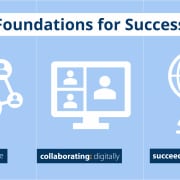3 Approaches to lead your Company into the Future through Good Decisions
If your road is suddenly blocked, you have to look for alternative routes to reach your destination. The lockdown measures of the current Corona crisis is a perfect example of this. If we look back to the financial crisis of 2007/08, we can see how many businesses from all over the world were subsequently forced to change the way they looked at their businesses.
In this context, three questions arise which I would like to briefly address:
- How do we find alternative routes?
- How do we decide which route is the best to take?
- What do you do if your surroundings change?
1. Finding alternative routes: the perspective matters
When navigating your way through a maze, you can only see to the next possibility to turn. You would have to climb up a tower to be able to see the world from a different perspective. Doing so would enable you to see the pathways of the maze from above and make out the route to the goal.

In practical day-to-day business life, every discussion with clients and partners or a well- prepared and managed strategy workshop with your own management team can highlight new ways and perspectives.
Indeed, in my work as an interim manager and business coach, I have seen how creative strategy workshops have established themselves as a guarantee for finding new business perspectives for many of my clients. Brainstorming elements and focused viewing from a different angle have very often brought management teams to use completely different approaches. This is how you can cultivate business strategies.
2. Making decisions: data and tools are key
When you look down from your tower and you can see various pathways leading to your goal, then you obviously want to know which is the best one to take!

In a car, we can find alternative routes at the push of a button on our navigator systems and they also work out the quickest, shortest and most cost-effective route to our destination.
Navigation systems also provide companies with the important information for finding the best way to gain more or better business. To make data and fact based decisions it is necessary to have an adequate IT infrastructure, a well-integrated system (e.g. ERP for entire companies or CRM for sales) and above all people with the competence to manage it.
For managers this means: on the one hand, teams must be provided with such tools, but they must also be enabled to use them accordingly.
Irrespective of the technology, it is critical to have a data structure with relevant success and performance indicators. If the instruments are implemented in the correct way, they can provide valuable help in decision-making when it comes to choosing the best route and how to steer towards your destination… remotely and in real-time!
3. Becoming adaptable: trend towards multi-channel marketing
Markets are changing at an ever-increasing rate, sometimes even overnight. This does not always have to manifest itself as a huge crisis. In general, leadership skills and the ability to adapt quickly to changes in the market are significant prerequisites for business success, especially in the world of international business.

In an extreme case, it is also a question of economic survival working with flexible and innovative business models. However, companies of all types that are currently operating successfully can benefit from such adjustments.
As an example, it can be totally justifiable for a cosmetics company to market an attractive brand exclusively via retail or online channels using a multi-level trading system or direct sales. After all, sales is part of the marketing mix and cannot be seen separately from any special product features.
Whilst companies tended to rather make either-or-decisions in the past, more and more take-both-decisions can be seen: do one without leaving the other! In individual cases, risk and opportunity should be assessed.
For the record, multi-channel marketing i.e. simultaneously treading several paths can be a good strategy in rapidly changing business surroundings … just in case the road ahead is blocked!

He founded perspective: international in 2013. He works as a strategic advisor, operative facilitator and interim manager with many years of experience in internationalization and international business development.





 Foto: © ipopba / stock.adobe.com
Foto: © ipopba / stock.adobe.com

